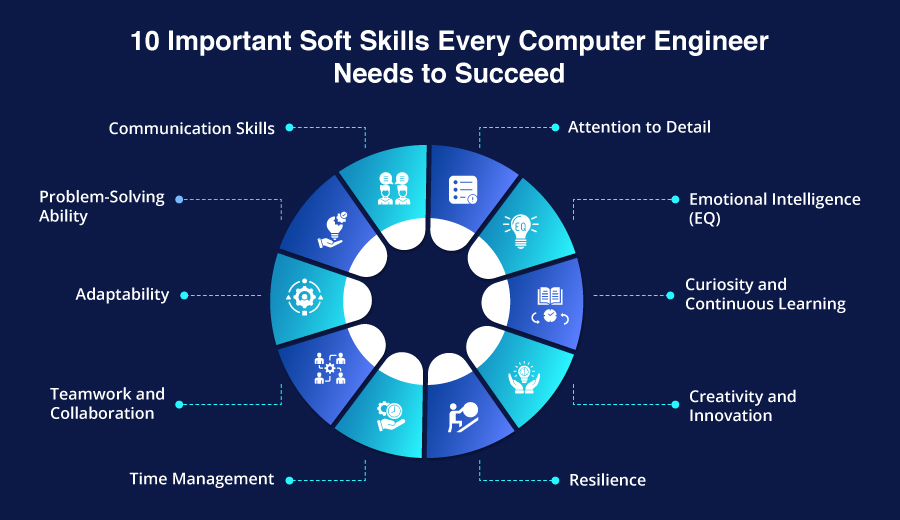10 Important Soft Skills Every Computer Engineer Needs to Succeed
When stepping into the world of computer engineering, technical expertise is only one part of the equation for success. Soft skills, often referred to as interpersonal or people skills, are becoming increasingly vital in fostering collaboration, clear communication, and adaptability in workplaces. Employees equipped with strong soft skills not only navigate challenges more effectively but also create value by strengthening relationships and driving innovation.
- Communication Skills: Effective communication is at the core of every successful project. As a computer engineer, you’ll often need to explain technical concepts to non-technical stakeholders, collaborate with cross-functional teams, and document your work. Strong verbal and written communication skills help you convey complex information clearly and build understanding across departments.
- Tip: Practice simplifying complex topics and adapt your language based on your audience’s background.
- Problem-Solving Ability: Computer engineering is all about solving problems. From debugging code to optimizing systems, engineers face challenges daily. The ability to approach problems methodically, think critically, and create innovative solutions is a hallmark of a successful engineer.
- Tip: Develop a structured approach to problem-solving, such as breaking down issues into smaller parts, analyzing each element, and brainstorming potential solutions.
- Adaptability: Technology is always evolving, and so must engineers. Adaptability helps you stay relevant as programming languages, frameworks, and industry standards change. Employers value engineers who can pivot and thrive in dynamic environments, ensuring that projects stay on track even amid change.
- Tip: Regularly upskill yourself through online courses, attend workshops, and stay updated with industry trends to remain flexible and agile.
- Teamwork and Collaboration: Most projects involve working with a team, often including developers, designers, project managers, and clients. Being able to collaborate effectively means knowing when to take the lead and when to support others. Good teamwork skills foster trust, reduce project friction, and increase overall productivity.
- Tip: Encourage open communication, be receptive to feedback, and maintain a positive attitude to strengthen team dynamics.
- Time Management: Computer engineers frequently juggle multiple tasks, from coding and debugging to project meetings and documentation. Effective time management allows you to prioritize tasks, meet deadlines, and handle high-pressure situations gracefully.
- Tip: Use productivity tools like Trello, Asana, or simple to-do lists to track your progress and ensure timely completion of tasks.
- Attention to Detail
: In coding, even a minor error can lead to bugs or significant system issues. A strong eye for detail helps engineers catch mistakes before they snowball, ensuring smoother project execution and higher-quality output.
- Tip: Double-check your work, use automated tools to identify errors, and develop habits that prioritize accuracy in your work.
- Emotional Intelligence (EQ): Emotional Intelligence is the ability to understand and manage your emotions, as well as empathize with others. For computer engineers working in teams or client-facing roles, EQ is invaluable in handling stressful situations, resolving conflicts, and fostering a supportive work environment.
- Tip: Practice active listening, reflect on your interactions, and cultivate self-awareness to improve your emotional intelligence.
- Curiosity and Continuous Learning: Curiosity drives innovation. The best engineers have a thirst for knowledge, constantly exploring new tools, languages, and technologies. This mindset is crucial in a field where staying updated can provide a competitive edge.
- Tip: Schedule regular time to read tech blogs, experiment with new tools, or attend webinars to satisfy your curiosity and continue your professional growth.
- Creativity and Innovation: Creativity isn’t just for artists; it’s essential for engineers too. Innovation often requires thinking outside the box to solve problems uniquely and efficiently. A creative engineer brings fresh perspectives and novel solutions to complex technical challenges.
- Tip: Encourage creative thinking by brainstorming with colleagues, taking breaks to reset, and tackling projects from different angles.
- Resilience: Engineering projects don’t always go as planned. Bugs, tight deadlines, and unexpected challenges are common. Resilience enables you to bounce back from setbacks and remain focused on your goals, ultimately helping you handle stress and overcome obstacles.
- Tip: Develop coping strategies, such as taking breaks or practicing mindfulness, to maintain mental well-being and resilience during challenging times.
Soft skills are the bridge between technical expertise and workplace success. By honing these skills, you can become a more effective, adaptable, and collaborative computer engineer who stands out in the field. Start by assessing your current strengths and weaknesses in these areas, then work to enhance them. Remember, these skills not only enrich your professional life but also foster personal growth, making you a well-rounded individual ready to thrive in any environment.
At SkillStone, we emphasize the holistic development of our students. Our programs are designed to not only impart technical knowledge but also nurture the soft skills that empower you to become a tech leader. Explore our courses and see how we can help you build a strong foundation in both technical and soft skills for a successful career in computer engineering.
Next post




